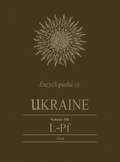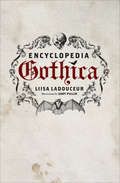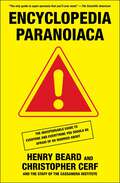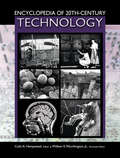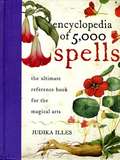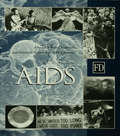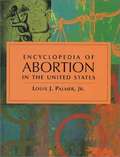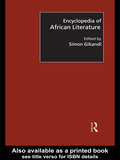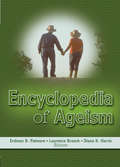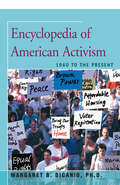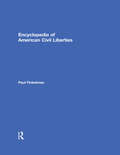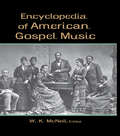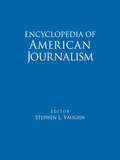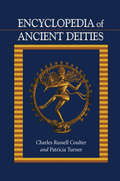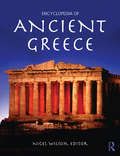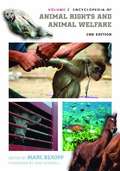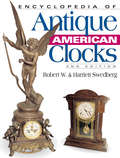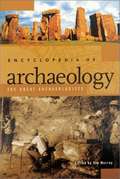- Table View
- List View
Encyclopaedia of Indian Literature, Volume I
by Indra Nath ChoudhuriThe thread of commonality like the quest for the spiritual realm, ethnic, religious and regional identities that find expression in different languages forms the basis of this volume.
Encyclopaedia of Indian Literature, Volume III
by Amaresh DattaThis volume of the Encyclopaedia concentrates on histories of different languages including Tibeto-Burman and Austro-Asian, and of literature in them. The usual fare of entries on significant authors and books is also provided in alphabetical order. These surveys mention, willy-nilly, a good many of the authors and books on which separate entries also occur in the Encyclopaedia, leading, maybe, to an impression of repetition; but in order to offer a clear perspective for an understanding of the growth and development of Indian literature, it was thought necessary to err by a reasonable excess, allowing the entries on books and authors to serve as illustrations of trends and turns in the process of development.
Encyclopaedia of Indian Literature, Volume IV
by Mohan LalThis volume of the Encyclopaedia covers a wide range of entries on books and authors, besides studies in some major literary genres, movements and trends--genres (or sub-genres) like Novel, Prose, Poetry, Poetics and Prosody: movements like Realism, Renaissance and Romanticism: trends like Patriotism and Progressivism. A general topic like Printing and Publishing, a sub-form of literature like Pen-Portraits, and philosophical systems like Nyaya and Samkhya also appear in the volume.
Encyclopaedia of Indian Literature, Volume V
by Mohan LalA collection of history, art, music, politics, religious beliefs from different languages is incorporated in this volume.
Encyclopaedia of Indian Literature, Volume VI
by Param Abichandani K. C. DuttBooks, authors and general topics like genres, movements and trends are covered in this volume.
Encyclopaedism from Antiquity to the Renaissance
by Jason König Greg WoolfThere is a rich body of encyclopaedic writing which survives from the two millennia before the Enlightenment. This book sheds new light on that material. It traces the development of traditions of knowledge ordering which stretched back to Pliny and Varro and others in the classical world. It works with a broad concept of encyclopaedism, resisting the idea that there was any clear pre-modern genre of the 'encyclopaedia', and showing instead how the rhetoric and techniques of comprehensive compilation left their mark on a surprising range of texts. In the process it draws attention to both remarkable similarities and striking differences between conventions of encyclopaedic compilation in different periods, with a focus primarily on European/Mediterranean culture. The book covers classical, medieval (including Byzantine and Arabic) and Renaissance culture in turn, and combines chapters which survey whole periods with others focused closely on individual texts as case studies.
Encyclopedia of Ukraine: L-Pf
by Danylo Husar StrukOver thirty years in the making, the most comprehensive work in English on Ukraine is now complete: its history, people, geography, economy, and cultural heritage, both in Ukraine and in the diaspora.
Encyclopedia Gothica
by Liisa Ladouceur&“Wickedly funny . . . Ideal for babybats and elder goths who&’ll appreciate the wealth of reminders of the experiences that make up goth life&” (NOW Magazine). A guidebook to the language of the most shadowy of subcultures, this work collects and defines more than 550 Gothic words and phrases. Compiled by an acclaimed Goth journalist and poet, this compendium provides insight into the unique vernacular of this fascinating community, describing in detail and with black humor the fashion, music, and lifestyle as well as sharing insider slang such as Babybat, Corp Goth, and the Gothic Two-Step. A Goth Band Family Tree and essential Goth listening, reading, and viewing recommendations are also included in this phantasmagorical work. &“Including illustrations from the talented Gary Pullin, Encyclopedia Gothica is the essential Goth reference whether you&’re wondering who Sisters of Mercy are or what absinthe is (and why Marilyn Manson has his own brand of the green stuff).&” —Geeks of Doom &“Ladouceur is a rare gem of a commenter that has the ability not only to laugh at herself, but to be able to get you to laugh at yourself, too.&” —HoustonPress &“Ladouceur has compiled a thorough and amusing encyclopedia about all-things-Goth . . . Whether you want to read about Nosferatu, Goth Juice or mall Goths you&’ll find brief and truly informative segments in Encyclopedia Gothica.&” —antiMusic &“Ladouceur&’s humor is a welcome rarity in an oft-misunderstood subculture.&” —Maclean&’s &“For those who continue to fear Goths, this book is a powerful antidote. Despite their spiky, menacing exterior, Encyclopedia Gothica details a culture as harmless and geeky as your average Star Wars fanboy or Kiss Army foot soldier.&” —National Post
Encyclopedia Paranoiaca
by Henry Beard Christopher CerfIGNORE THIS BOOK AT YOUR PERIL! Did you know that carrots cause blindness and bananas are radioactive? That too many candlelight dinners can cause cancer? And not only is bottled water a veritable petri dish of biohazards (so is tap water, by the way) but riding a bicycle might destroy your sex life? In Encyclopedia Paranoiaca, master satirists Henry Beard and Christopher Cerf have assembled an authoritative, disturbingly comprehensive, and utterly debilitating inventory of things poised to harm, maim, or kill you—all of them based on actual research about the perils of everyday life. Painstakingly alphabetized, cross-referenced, and thoroughly sourced for easy reference, this book just might save your life. (Apologies in advance if it doesn’t.) Beard and Cerf cite convincing evidence that everyday things we consider healthy—eating leafy greens, flossing, washing our hands—are actually harmful, and items we thought were innocuous— drinking straws, flip-flops, neckties, skinny jeans— pose life-threatening dangers. Did you know that nearly ten thousand people are sent to the emergency room each year because of escalator accidents, and, despite what you’ve heard, farmers’ markets may actually be less safe than grocery stores? And if you’re crossing your legs right now, you’re definitely at serious risk. Hilarious, insightful, and, at times, downright terrifying, Encyclopedia Paranoiaca brings to light a whole host of hidden threats and looming dooms that make asteroid impacts, planetary pandemics, and global warming look like a walk in the park (which is also emphatically not recommended). *** The Definitive Compendium of Things You Absolutely, Positively Must Not Eat, Drink, Wear, Take, Grow, Make, Buy, Use, Do, Permit, Believe, or Let Yourself Be Exposed to, Including an Awful Lot of Toxic, Lethal, Horrible Stuff That You Thought Was Safe, Good, or Healthy; All Sorts of Really Bad People Who Are Out to Get, Cheat, Steal from, or Otherwise Take Advantage of You; and a Whole Host of Existential Threats and Looming Dooms That Make Global Warming, Giant Meteors, and Planetary Pandemics Look Like a Walk in the Park (with Its High Risk of Skin Cancer, Broken Bones, Bee Stings, Allergic Seizures, Animal Attacks, Criminal Assaults, and Lightning Strikes)
Encyclopedia of 20th-Century Technology
by Colin A. HempsteadComprised of 395 essays arranged alphabetically, most on individual objects, artifacts, techniques, and products, this is an up-to-date reference work for all those involved in teaching or researching the history of twentieth-century technology, as well as the serious general reader. The core of each of the main entries is a technical description, within a historical narrative, of about 1,000 words plus illustrations and further reading. There are also about 30 longer survey entries that that address broad questions of technological systems, such as the context in which the various technologies were developed, discussions of any controversies and schools of thought, comparisons between different political and economics systems, and the various ways in which different nations have attempted to make and apply science and technology policies.
Encyclopedia of 5,000 Spells
by Judika IllesEnter the World of Folklore, Myth, and Magic Discover binding spells and banishing spells, spells for love, luck, wealth, power, spiritual protection, physical healing, and enhanced fertility drawn from Earth's every corner and spanning 5,000 years of magical history.
Encyclopedia of AIDS: A Social, Political, Cultural, and Scientific Record of the HIV Epidemic
by Raymond A. Smith Jane RosettThe Encyclopedia of AIDS covers all major aspects of the first 15 years of the AIDS epidemic, including the breakthroughs in treatment announced at the International AIDS Conference in July 1996. The encyclopedia provides extensive coverage of major topics in eight areas: basic science and epidemiology; transmission and prevention; pathology and treatment; impacted populations; policy and law; politics and activism; culture and society; and the global epidemic. With more than 300 entries written by 175 specialists and illustrated with more than 100 photographs and charts, the Encyclopedia of AIDS is an essential reference work for students at the undergraduate and graduate levels, professionals in a wide variety of medical, service, and care fields, academics, researchers, journalists, and general readers.
Encyclopedia of Abortion in the United States
by Louis J. PalmerEntries are included for each state, giving that state's legal history regarding abortion, with separate sections before and after Roe v. Wade. Each state entry includes tables and charts of abortion statistics by age, race, and marital status from 2000 through 2004, and also includes the full content of the state's codes. The entries have been updated in this edition to reflect changes in state and federal laws. Other entries describe medical conditions, pro-choice and pro-life organizations, and the voting record on abortion of each Supreme Court justice. Annotation ©2009 Book News, Inc., Portland, OR (booknews.com)
Encyclopedia of African Literature
by Simon GikandiThe most comprehensive reference work on African literature to date, this book covers all the key historical and cultural issues in the field. The Encyclopedia contains over 600 entries covering criticism and theory, African literature's development as a field of scholarship, and studies of established and lesser-known writers and their texts. While the greatest proportion of literary work in Africa has been a product of the twentieth century, the Encyclopedia also covers the literature back to the earliest eras of story-telling and oral transmission, making this a unique and valuable resource for those studying social sciences as well as humanities. This work includes cross-references, suggestions for further reading, and a comprehensive index.
Encyclopedia of Ageism
by Diana K. Harris Erdman B. Palmore Laurence BranchLearn more about age discrimination and how it affects us allThe Encyclopedia of Ageism is a comprehensive review of over 125 aspects of ageism, alphabetically arranged for easy access. Written by 60 experts, the book examines topics such as anti-aging, stereotypes, and the media-with numerous references for further information. You'll find an alphabetical list of the entries, a detailed index, and a list of the entries categorized by subject, to help you find what you need fast. This resource will increase your awareness about the many facets of ageism and provide you with a wealth of concepts, theories, and facts about ageism. This important resource exposes the many faces of dehumanization through the elder neglect and prejudice that results from today's worldwide youth-oriented culture. The Encyclopedia of Ageism will help you recognize ageism when you encounter it and avoid it in your own thinking and actions. The book is a valuable guide for anyone working with older people and for older people themselves.With the Encyclopedia of Ageism, you will be able to identify personal, cultural, and institutional sources of ageism, such as: age denial age inequality/stratification sexuality scapegoating abuse the disengagement theory and so much more!This eye-opening reference shows how discrimination against elders can have consequences to the aged, the youth, the economy, and society as a whole. The Encyclopedia of Ageism promotes a future where the human rights of older persons are preserved and aging is considered a positive stage in the cycle of life. With this book, you will find strategies for reducing ageism, changing perceptions, and enhancing the quality of life for senior citizens and-someday-yourself.
Encyclopedia of American Activism: 1960 to the Present
by Ph.D. Margaret DiCanioThe turbulence of the 1960s and 1970s spawned a spectrum of activist movements. In spirit and action, events ranged from: gentle to violent; from Tree People to Bloody Sunday; from Community Mental Health to Black Power. This rapid stream of social and political change defined the second half of the 20th century, yet had roots in the first half. The baby boom generation launched many movements. Unlike their Depression/WWII parents, the boomers, a large cohort of unattached, young adults, had no looming familial and social responsibilities. They had the freedom and resources for the consuming task of changing the world.
Encyclopedia of American Civil Liberties: Volumes A-z
by Paul FinkelmanThis Encyclopedia on American history and law is the first devoted to examining the issues of civil liberties and their relevance to major current events while providing a historical context and a philosophical discussion of the evolution of civil liberties. Coverage includes the traditional civil liberties: freedom of speech, press, religion, assembly, and petition. In addition, it also covers concerns such as privacy, the rights of the accused, and national security. Alphabetically organized for ease of access, the articles range in length from 250 words for a brief biography to 5,000 words for in-depth analyses. Entries are organized around the following themes: organizations and government bodies legislation and legislative action, statutes, and acts historical overviews biographies cases themes, issues, concepts, and events. The Encyclopedia of American Civil Liberties is an essential reference for students and researchers as well as for the general reader to help better understand the world we live in today.
Encyclopedia of American Folk Art
by Gerard C. Wertkin Lee KoganFor a full list of entries, contributors, and more, visit the Encyclopedia of American Folk Art web site.This is the first comprehensive, scholarly study of a most fascinating aspect of American history and culture. Generously illustrated with both black and white and full-color photos, this A-Z encyclopedia covers every aspect of American folk art, encompassing not only painting, but also sculpture, basketry, ceramics, quilts, furniture, toys, beadwork, and more, including both famous and lesser-known genres.Containing more than 600 articles, this unique reference considers individual artists, schools, artistic, ethnic, and religious traditions, and heroes who have inspired folk art. An incomparable resource for general readers, students, and specialists, it will become essential for anyone researching American art, culture, and social history.
Encyclopedia of American Gospel Music
by W. K. McNeilThe Encyclopedia of American Gospel Music is the first comprehensive reference to cover this important American musical form. Coverage includes all aspects of both African-American and white gospel from history and performers to recording techniques and styles as well as the influence of gospel on different musical genres and cultural trends.
Encyclopedia of American Journalism
by Stephen L. VaughnThe Encyclopedia of American Journalism explores the distinctions found in print media, radio, television, and the internet. This work seeks to document the role of these different forms of journalism in the formation of America's understanding and reaction to political campaigns, war, peace, protest, slavery, consumer rights, civil rights, immigration, unionism, feminism, environmentalism, globalization, and more. This work also explores the intersections between journalism and other phenomena in American Society, such as law, crime, business, and consumption. The evolution of journalism's ethical standards is discussed, as well as the important libel and defamation trials that have influenced journalistic practice, its legal protection, and legal responsibilities. Topics covered include: Associations and Organizations; Historical Overview and Practice; Individuals; Journalism in American History; Laws, Acts, and Legislation; Print, Broadcast, Newsgroups, and Corporations; Technologies.
Encyclopedia of Ancient Deities
by Charles Russell Coulter Patricia TurnerThe history of the divine is the history of human thought. For as long as men and women have pondered the mysteries of their existence, they have answered their own questions with stories of gods and goddesses. Belief in these deities shaped whole civilizations, yet today many of their names and images lie buried.The Encyclopedia of Ancient Deities makes those names available to the general reader as well as the scholar. This reference work lists all the known gods through recorded history. Alphabetically arranged entries provide the name of each deity (with alternate spellings), as well as notes on names that may be linguistically or functionally related. The tribe or culture that worshiped the deity is identified, and the god's origins and functions are explained.An extensive bibliography provides opportunities for further research and an exhaustive index provides access to the entries through virtually all names, forms and kinds of deities.
Encyclopedia of Ancient Greece
by Nigel WilsonExamining every aspect of the culture from antiquity to the founding of Constantinople in the early Byzantine era, this thoroughly cross-referenced and fully indexed work is written by an international group of scholars. This Encyclopedia is derived from the more broadly focused Encyclopedia of Greece and the Hellenic Tradition, the highly praised two-volume work. Newly edited by Nigel Wilson, this single-volume reference provides a comprehensive and authoritative guide to the political, cultural, and social life of the people and to the places, ideas, periods, and events that defined ancient Greece.
Encyclopedia of Animal Rights and Animal Welfare
by Marc BekoffBekoff (U. of Colorado, Boulder) presents an updated reference for students, researchers, and general readers covering the full scope of animal rights and animal welfare from a global, interdisciplinary perspective. Thoroughly revised to reflect developments since publication of the first edition 11 years ago, the text has been expanded from a one- to two-volume publication. It contains 207 entries, by 150 international experts, covering an array of topics, from dog fighting to endangered species in zoos, animals as disease carriers, conservation ethics, and veganism. The second edition features a number of entries on various cultural and religious views of animals, and the latest research on animal cognition and sentience. Each entry offers a brief summarization of the issue and includes a list of publications for further reading. The text also includes a new foreword by Jane Goodall, a chronology of historical events, and a list of print and online resources. Annotation c2010 Book News, Inc., Portland, OR (booknews.com)
Encyclopedia of Antique American Clocks
by C H WendelFrom old schoolhouse clocks to stately grandfather clocks, the Encyclopedia of Antique American Clocks presents the most comprehensive guide to America's clocks. More than 700 photographs of clocks include detailed descriptions and current market values. The clocks are presented in an easy-to-follow format organized by clock type. Also included is information about the major clock manufacturers, and overview of clock types and a brief history of clock making. Arranged by clock type, the Encyclopedia of Antique American Clocks includes: Grandfather clocks Wall clocks Classic clocks Shelf clocks Novelty clocks Special chapters on: Clock types History of clock making Clocks from smaller clock makers Leading clock makers Glossary Bibliography Photo index
Encyclopedia of Archaeology, Volume 1: The Great Archaeologists
by Tim MurrayThis two-volume set contains 58 biographies that constitute a history of archaeology from its beginnings in Renaissance antiquarianism, to the present day. Arranged chronologically, each entry contains a brief summary of the individual's importance and a discussion of the life and contributions of the person (with a focus on his or her role in the development of archaeology as a discipline), and a bibliography.

